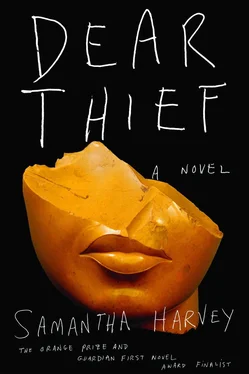I did not want to play cards, you have to be in the mood, you have to feel alright about losing or otherwise feel invincible; I told him I was sorry. ‘She treats me as if I am a monster,’ he said. ‘What have I done? You’re a woman — tell me what did I do?’ It was here that the music at the club started up, or that I noticed it had started up, so I stood with my arms open and beckoned him with a quick flick of the fingers of one hand, like I used to with Teddy when he knocked his knee and was about to cry. We held each other loosely and danced in slow steps around the room to these drifting sounds of bebop. Yannis put his big head on my shoulder. How dare she do this to him? I thought suddenly. This wife, whose name I don’t think I have even imparted to you and which I now don’t think I will, in case she is not deserving of it. How dare she simply escape like this, as if she has no responsibilities?
I have always felt a kind of solidarity with Yannis, maybe in part because we both have just one child, a son, from whom we are far too estranged. Sometimes I feel we are both like disused sea ports, no longer harbouring anything. But this is self-pitying and ridiculous, I see it; we made our children, we were not made for them, we are not nothing without them. This is a coward’s view of life. And then I felt that his wife, Stefania — perhaps she does deserve a name after all — was precisely not a coward because she was doing what she wanted without giving quarter. Why should we give quarter? It is so hard in life to know what we want that surely, when we do know, we must act. She and Yannis had been together since they were teenagers; she had been a mother since the age of eighteen or nineteen. She had earnt herself some autonomy. This is when I heard your voice: The tyranny of possession! it said. The greatest tyranny of all is men’s possession of women and women’s possession of men. We want to own one another so that the other cannot outgrow us. You know how Chinese women bind their feet until the feet are deformed? This is what we do to one another’s hearts.
I want you to know that I had these thoughts quickly, and that although I heard you say all those words, I heard those quickly too, so that the song we were dancing to — it might have been ‘Cotton Tail’, I don’t remember — was not even a third of the way through by this point. I found I was humming into Yannis’ ear, and that my shoulder, which was bare because of it being a warm night, was moist with his tears.
Then, just as I had made peace with Yannis’ wife, I became angry with Lara. I thought, how can Lara escape her religion? I remembered her phrase, about carrying a sack of stones. A sack of stones that can be picked up and put down, dipped into as and when. But religion is not like this; the weight of God is upon those who believe, a burden from above, and love is the shouldering of this burden, the glad acceptance of it. Lara wants to think there is nothing higher than her head, and that she can orchestrate her own salvation through her acts. Next she will become a humanist, without realising that humanism is to a Christian what methadone is to a heroin addict, a way of weaning off. She will begin to believe in humans instead of God because it is hard to give up believing all at once. And then, when humans fail her, she will become a spiritualist and decide she can flee this illusory world like a bird sliding obliquely off the screen, slip through its gauze, as if religion’s sole purpose is to make escape artists of us.
Of course, I was not angry with Lara. It is strange how unwilling anger is to alight directly on its object. Yannis’ hand slipped to my lower back and then down a little further still, and I let him because it did no harm. I said to him: ‘Yannis, the student asks the master why Japanese teacups are so delicate and easy to break. The master says that the teacups aren’t too delicate, it’s just that the person who drinks from them is too heavy-handed.’ He drew his head back and looked at me with the same slightly hostile incomprehension he had shown over the word humus . I concluded: ‘It’s not for teacups to change, but for us to adapt to what is.’
It was the wrong thing to say, I know, because he raised his hand to my waist again in disapproval. And it was not really even all that relevant to him, but I said it because I was pressed upon by a feeling of — what can I say? — stringency, or obedience. It is not for us to try to change the world to something that suits us better, but for us to change, to bend to a greater weight. When he left ten or fifteen minutes later, at the end of the next song, which was ‘Goodbye Pork Pie Hat’, which we danced to in thoughtless silence, I stood at the window and watched him lope down the street towards his shop. He was going to get ready for the others who were coming at ten-thirty to play Poker. All I could think of was how I had used to dance with Nicolas and how unexpectedly gifted he was at finding a coherent stream of movement in a piece of music and how he would thread us both along it. We danced, you know, a lot, never formally but around the house, especially the big, decrepit house we rented in London just after we were married and before Teddy came. He was not a good dancer as such, he was just good at finding what others could not beneath the surface — mining, I suppose, mining the music for its rhythm. He had a way of holding my waist as if it were a piece of machinery he had undergone five years of training to use.
We lived in that house for eight months. It didn’t have a single useable surface that he had not danced me towards and laid me on and entered me at. There was no surface that both my back and front had not become intimately familiar with, and no view of the floorboards or ceiling’s coving I had not had through the blind or ecstatic or gentle vision of being made love to by him, and no part of the bathroom mirror that had not reflected our daily selves doing their daily things, our white teeth bared for the brush, our bodies lowered into the bath, no spring in the bed that had not known the weight of our deepest of sleeps, no knot of the hallway rug that had not known the precise indent of our four feet, no inch of brass on the doorhandles that had not been dulled with our palms.
Shall I tell you what I think? I think Yannis should go after his wife. I think he should rush after his wife and bind his feet in front of her.
Here we are, you and I, just back from Spain. We oppose each other across a table with a fan of thumbed cards. Twist, you say. Twist again. Like we did last summer, I reply. Your cards pressed onto the table add up to twenty, mine to eighteen, there is a flurry of dealing in which fingers fly and a twist and a twist and a stick; maybe I win. The games are quick and thoughtless and fill a post-supper lull while Teddy sleeps and the cottage becomes a dark missable shape in the lane. The cards are dealt, the pack settled, the trivial risks taken; if you are going to twist you flare your nostrils, if you are going to stick you suck in your cheeks: this is how I know your next move and how I have the card ready when you ask for it.
In the two or more years you’ve been staying with us you have been trimming your hair by increments and oiling it, so that it is thick and dark and seems to flesh out your features, and the fringe you cut for yourself in Spain makes your eyes look startled. There is none of that flaming orange grease on your lids, and without that your eyes are freer and wider and the space between them more emptily purposeless. You have taken to looking at me squarely while your pupils expand and shrink with the movement of candle flame. You ask me if you should leave. Where would you go? I reply, and you shrug one shoulder as if this is irrelevant. I don’t give you a yes or no, and so you stay.
Читать дальше












